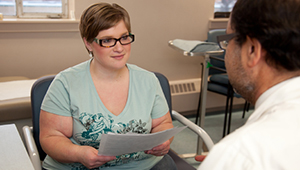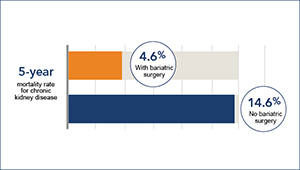Obesity
Research overview
“Obesity is the number-one health problem in the United States because it negatively affects our population’s health more than any other condition,” said Kaiser Permanente Washington Health Research Institute Senior Investigator David Arterburn, MD, MPH. Kaiser Permanente Washington researchers are doing practical research to learn how doctors, patients, families, employers, and policymakers can best work together to prevent and treat obesity.
“We’re focusing on three ways to halt the obesity epidemic,” said Senior Investigator Dori Rosenberg, PhD, MPH. “We’re helping to change obesity-promoting environments, bringing evidence-based prevention and treatment programs into health care systems, and helping people develop lifelong healthy diet and activity habits.”
Kaiser Permanente Washington obesity research areas include:
- reducing sedentary behavior and promoting physical activity and healthy diet in various age groups, populations with chronic conditions, and families;
- shared decision making to help patients find the best way to a healthy weight;
- implementing health coaches in primary care to support behavior changes;
- social networks that support lifestyle change programs;
- relationships between medications and genetic factors in developing obesity;
- health system, community, and national policies that address obesity;
- relationships between obesity and depression, diabetes, and other conditions; and
- long-term benefits and risks of bariatric (weight loss) surgery.
“Obesity is caused by many factors, so at Kaiser Permanente Washington, we’re working on many levels,” said Paula Lozano, MD, MPH, a senior investigator and Kaiser Permanente Washington’s assistant medical director for preventive care. “We’re improving health care to help people who are obese now. But since obesity is a societal problem, we’re also studying how to change our homes and workplaces and neighborhoods to create more healthy environments.”
Recent publications on Obesity
Arterburn D, McCulloch D. Bariatric Surgery for Type 2 Diabetes: Getting Closer to the Long-term Goal. JAMA. 2016;315(12):1276-7. doi: 10.1001/jama.2016.1884. PubMed
Knerr S, Bowen DJ, Beresford SA, Wang C. Genetic causal beliefs about obesity, self-efficacy for weight control, and obesity-related behaviours in a middle-aged female cohort. Psychol Health. 2016;31(4):420-35. doi: 10.1080/08870446.2015.1115503. Epub 2016 Jan 2. PubMed
Drewnowski A, Aggarwal A, Cook A, Stewart O, Moudon AV. Geographic disparities in healthy eating index scores (HEI-2005 and 2010) by residential property values: findings from Seattle Obesity Study (SOS). Prev Med. 2015 Dec 3. pii: S0091-7435(15)00357-6. doi: 10.1016/j.ypmed.2015.11.021. [Epub ahead of print]. PubMed
Rosenberg DE, Gell NM, Jones SM, Renz A, Kerr J, Gardiner PA, Arterburn D. The feasibility of reducing sitting time in overweight and obese older adults. Health Educ Behav. 2015 Oct;42(5):669-76. doi: 10.1177/1090198115577378. Epub 2015 Mar 20. PubMed
Arterburn D, Wood GC, Theis MK, Westbrook EO, Anau J, Rukstalis M, Boscarino JA, Daar Z, Gerhard GS. Antipsychotic medications and extreme weight gain in two health systems. Obes Res Clin Pract. 2015 Sep 8. pii: S1871-403X(15)00126-X. doi: 10.1016/j.orcp.2015.08.012. [Epub ahead of print]. PubMed
Researchers in Obesity
 David E. Arterburn, MD, MPHSenior Investigator |
 Allen Cheadle, PhDSenior Investigator, KPWHRI; Senior Research Associate, CCHE |
 Andrea J. Cook, PhDSenior Biostatistics Investigator |
 Maricela Cruz, PhDAssociate Biostatistics Investigator |
 Nicole M. Gatto, PhD, MPHPrincipal Collaborative Scientist |
 Beverly B. Green, MD, MPHSenior Investigator |
 Mikael Anne Greenwood-Hickman, MPHSenior Collaborative Scientist |
 Paula Lozano, MD, MPHSenior Investigator; Director, ACT Center |
 Dori E. Rosenberg, PhD, MPHSenior Investigator |
 Gregory E. Simon, MD, MPHSenior Investigator |











